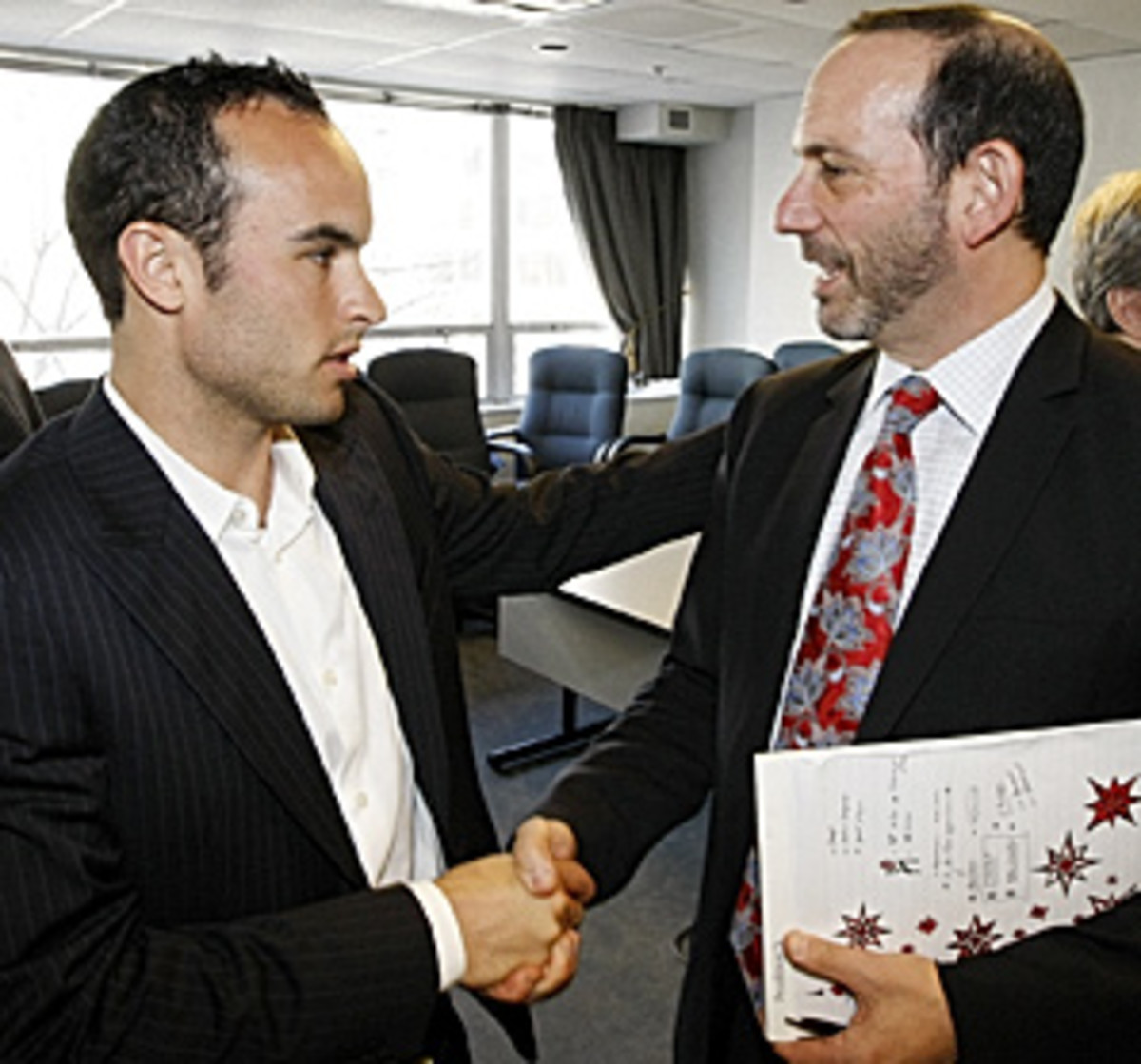
MLS labor deal suits both parties
Past the hard-data details that have finally emerged, we now see what both sides achieved in the bigger picture: The real take-home from all this may be an enhanced mutual understanding between the parties.
That's important, because similar labor negotiations in other sports have left sore feelings and damaged relationships on both sides. MLS' potentially destabilizing process of labor negotiations has apparently come and gone for now without such lingering battle scars.
The league and the players' union capped a difficult period Saturday by agreeing in principle to a new collective bargaining agreement, one that stretches through 2014. The timing was critical because players had threatened to strike by Tuesday, two days before the season opener, absent of a new agreement.
The agreement, brokered with significant guidance from federal mediator George Cohen, allows the strike-threatened 15th MLS season to begin Thursday as scheduled. So it's "game on" for expansion Philadelphia and last year's expansion darling, Seattle.
Cohen, director of the Federal Mediation and Conciliation Service, was instrumental in helping steer past the trouble. And make no mistake, trouble was afoot. Any cancellation of matches would create huge issues in public perception and media portrayal for a league still wading in red ink, one still fighting battles in attendance and larger cultural acceptance.
Players didn't even approach gaining everything they wanted in this new CBA, which still requires formal ownership approval. But they believe their concerns were finally heard, and that management now understands what the fuss (and threats of such a potentially disastrous work stoppage) was all about. Whereas past negotiations were far more-one sided, as owners gave token heed to labor's say and then more or less dictated terms, a genuine understanding between the parties seems to have sprouted from these negotiations.
"That was one of our biggest frustrations coming in," Los Angeles Galaxy defender Todd Dunivant said by phone earlier this week from Southern California. "We often felt marginalized, like our opinions didn't matter. We were just told what was and wasn't going to happen by the league."
He said MLS commissioner Don Garber and others on the league side actually made an attempt to lean in and listen hard this time around. "I think he really got a feeling for certain things that we felt were truly unfair and that needed to be corrected," Dunnivant said.
Garber voiced similar sentiments Tuesday during his annual preseason media teleconference. "Now that we better understand each other, now that we have a deal that in my mind will be mutually beneficial, we now have an ability to work together in a more productive relationship," he said, "so that we can compete against all the other factors that are in front of us, and that are in many ways impacting our growth."
The commissioner, now in his 11th year, was highly complimentary of the players. He praised them for avoiding the temptation to be ideologues, instead pressing for practical changes that would cover the range of players -- i.e., young talent and not just the group of veterans more prominently represented in negotiations.
"I'm really proud of them for that," Garber said.
Here's what the new agreement does:
• Increases the salary cap by about 10 percent, from $2.315 million per club in 2009 to $2.55 million in 2010. It will rise 5 percent annually over the length of the agreement (which goes through 2014). The league and the union still need to see how the ongoing roster changes will affect the median salary, which was formerly $88,000.
• Increases the minimum salary for senior roster players from $34,000 to $40,000 in 2010, and 5 percent from year to year thereafter.
• Establishes a new "re-entry" draft for out-of-contract players. This was a key compromise, for it allowed the league to hold fast on one of its core principles -- that owners would never bid against one another for players (i.e., true free agency). Meanwhile, it eliminated one of the most distasteful (from the players' standpoint) consequences of single-entity MLS control: that teams could cut a player and yet still retain his rights and demand compensation for him.
• Added a selection of other players who were cut or didn't have options exercised to the new re-entry draft.
• Added bonuses for wins in MLS games and international tournaments as well as appearance fees for international exhibitions.
• Established a mechanism for studying a rebirth of the Reserve Division. In the event the rosters are expanded past the current 24, the salary for those players will be a minimum of $31,250.
While the league maintained its hard line on even baby steps toward free agency, there was compromise that helped address player concerns and should improve their career options, at least.
Plus, there's a bigger picture to consider here, too. All this will come up again in 2014. This issue of free agency will arise again, and it will be a bigger issue then. Dunnivant said the players always understood -- but do have a better understanding now -- why the league is so dead set against it. And he said the players have always attempted to be cognizant of the owners' overall financial commitment. They never wanted to "bankrupt the league," he said, although the sides disagreed greatly on how much damage free agency could inflict in a salary-cap system.
Either way, any hard-won concessions this time move the players in a more favorable position once the next negotiations begin.
"With CBAs, it's gradual steps," Dunnivant said. "The league was only 8 or 9 years old when we got our first CBA. It wasn't a great CBA by any means. But it was a start. It gave us something we could build off. And now I think we're that much further along when we get to the next one."




